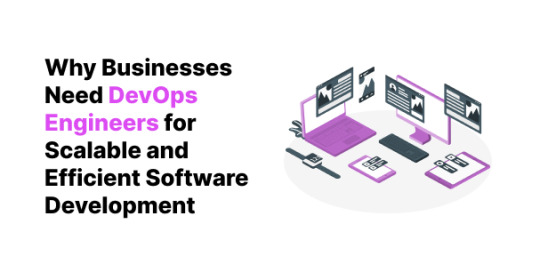#Devops & Engineering
Explore tagged Tumblr posts
Text

2 notes
·
View notes
Text
What is the scope of devops engineering Jobs in the coming year 2024?
DevOps engineering Jobs in 2024, The scope of devops in the coming year 2024. DevOps (Development and Operations) is a set of practices that aim to automate and improve the process of software development and IT operations. The adoption of DevOps has been steadily increasing due to its ability to enhance collaboration, streamline workflows, and accelerate the delivery of software.
Here are some trends and aspects to consider regarding DevOps engineering jobs and the scope of DevOps in the coming years
Increased Demand: DevOps has been in high demand as organizations recognize its value in achieving faster development cycles, improved collaboration, and more reliable software releases.
Evolution of DevSecOps: The integration of security into the DevOps process, known as DevSecOps, is gaining prominence. Security is becoming an integral part of the development lifecycle to address vulnerabilities early in the process.
Cloud-Native Technologies: The adoption of cloud-native technologies and container orchestration tools like Kubernetes continues to grow. DevOps engineers with expertise in these areas are likely to be in high demand.
Automation: Automation remains a key focus in DevOps. Skills related to automation tools for configuration management, deployment, and testing, such as Ansible, Puppet, and Jenkins, will continue to be essential.
Site Reliability Engineering (SRE): SRE principles, which focus on reliability, scalability, and performance, are becoming more prevalent. Job roles that combine DevOps and SRE skills may become increasingly common.
Cross-Functional Teams: DevOps promotes collaboration between development, operations, and other teams. Companies are likely to seek professionals who can work effectively in cross-functional teams.
Continuous Learning: The DevOps landscape evolves rapidly, and professionals are expected to engage in continuous learning to stay updated on the latest tools, practices, and methodologies.
Remote Work: The trend toward remote work, accelerated by global events, has impacted various industries, including IT. DevOps teams may continue to embrace remote or hybrid work arrangements.
To stay relevant in the field of DevOps, it's crucial to stay informed about emerging technologies, tools, and best practices. Certifications and continuous skill development will be valuable for professionals seeking to advance their careers in DevOps engineering.
1 note
·
View note
Text
7. Service-Provisioning: bessere digitale Services mit weniger Kosten: "MHM Digitale Lösungen UG: Wie Sie mit DevOps Engineering Kosten sparen und bessere digitale Services bereitstellen"
#DevOpsEngineering #ServiceProvisoning #Digitalisierung #Kosteneinsparung #Automatisierung #Skalierung #Effizienz #Qualität #Kontrolle #Verfügbarkeit
Digitale Lösungen sorgen dafür, dass Sie Kosten sparen und leistungsfähige digitale Services bereitstellen können. DevOps Engineering ist eine Technologie, die diesen Zweck unterstützt. DevOps Engineering ermöglicht es Ihnen, sich an den sich ständig ändernden digitalen Bedürfnissen Ihrer Kunden anzupassen, indem es die Entwicklungs- und Betriebsarbeit in Einklang bringt. Dies bedeutet, dass Sie…
View On WordPress
#Automatisierung#DevOps Engineering#Digitalisierung#Effizienz#Kontrolle#Kosteneinsparung#Qualität#Service-Provisioning#Skalierung#Verfügbarkeit.
0 notes
Text



I found myself surrounded by companions daring to tackle a real software architecture challenge. We shared a good wine and cheese to conquer it together! (Unfortunately, there’s always something waiting to be dealt with on Monday.)
The glow of my Neovim terminal in Monokai theme reflects my rhythm — a guy who doesn’t stop on weekends but knows that balance isn’t about being all-in, all day.
The setup screams character: a seamless fusion of productivity and comfort. Lazygit commands at my fingertips, a Ghibli-esque avatar paired with Neofetch adding a touch of Tumblr aesthetic, and a playlist of Korean indie OSTs playing in the background to add depth to every keystroke.
This is how I drive — in code, creativity, and moments that are unapologetically mine.
#study blog#study aesthetic#studyblr#programmer#software development#student#studyblr community#studyblr europe#studyblr aesthetic#dark academia#dark aesthetic#night sky#student life#student university#developer#coding#programming#software#softwareengineering#software engineer#software engineering#software developers#devops#studyblr brazil#studies#study inspiration#study spot#self improvement#aesthetic
56 notes
·
View notes
Text
The more coding and IT stuff you do it, the more you learn, the more you learn the more you realise how much you don’t know.
110 notes
·
View notes
Text
The developers i work with are asking chatgpt questions about my infrastructure that are in our docs. Unsurprisingly they are getting bad advice for our particular setup, and are bothering my team with a bunch of questions about if the advice is right and what would happen if they ran those commands.
41 notes
·
View notes
Text
Hire me!
A reminder that I'm looking for work.
I'm a high-level devops engineer with experience of running my own team. I've previously worked at Facebook and Mozilla.
My CV is available at https://dave.io/go/cv if you want to check it out.
Feel free to share it with anyone who might be interested.
Thanks!
2 notes
·
View notes
Text
SPARK TECHNOLOGIES
We deliver value by identifying opportunities that align with business objectives and adopting an agile approach to implement them.
#Web developement#Software testing#Devops & Engineering#Salesforce#Mobile Application Developmen#Data Analytics#IT Consulting#IT Outsourcing#Web Design#Content Management System#Digital Marketing
2 notes
·
View notes
Text
SPARK TECHNOLOGIES

We deliver value by identifying opportunities that align with business objectives and adopting an agile approach to implement them. We take full accountability for the IT and operation initiatives we propose and help you accomplish business goals faster. click here for more
#webdevelopement#softwaretesting#devops & engineering#salesforce#mobile application development#data analytics#it consulting#it outsourcing#web design#content management system#digital marketing
2 notes
·
View notes
Text
Leading the Way in IT- ChatGPT's Transformative Impact
In the dynamic world of Information Technology, a transformative force is reshaping the field: ChatGPT. This advanced AI, built on the sophisticated GPT-3.5 framework, is not just a revolutionary tool but a catalyst for unprecedented innovation, efficiency, and enhanced human-AI collaboration.

The ChatGPT Edge With its deep understanding of context, nuanced responses, and adaptive learning, ChatGPT stands as a groundbreaking advancement in natural language processing. It's a boon for IT professionals, enabling them to tackle complex problems, improve team communication, and offer solutions tailored to the unique challenges of the IT realm. Revolutionizing DevOps Communication ChatGPT marks a significant leap in DevOps, facilitating smoother communication and collaboration. It excels in interpreting natural language, allowing real-time issue resolution, task automation, and fostering a culture of continuous improvement. DevOps teams can leverage ChatGPT for enhanced decision-making and adaptability in the ever-changing landscape of software development. Enhancing Product Development Cycles In product development, ChatGPT's contribution is invaluable. It streamlines the lifecycle by grasping complex requirements and generating structured specifications. Teams can use ChatGPT to refine ideas rapidly, leading to more effective development processes and innovative solutions that align with user expectations. Advancing Mobile and Web Application Development For web and mobile app developers, ChatGPT accelerates the coding process. Its ability to understand context and generate code quickens development cycles. Integrating ChatGPT into workflows helps tackle coding challenges, troubleshoot, and enhance code quality, resulting in a more agile and responsive development process. The Future of IT with ChatGPT Looking ahead, ChatGPT's role in IT is poised to expand significantly. This fusion of conversational AI and technical acumen will revolutionize collaboration and innovation across DevOps, product development, and app development. ChatGPT is set to be a key driver in creating an adaptable, efficient, and collaborative IT ecosystem.
ChatGPT is guiding the IT industry towards an era where efficiency and collaboration take center stage. As organizations adopt this transformative technology, the sectors of DevOps, product development, and app development are on the cusp of a major evolution. Embrace ChatGPT as it leads the charge in IT innovation, where efficiency meets creativity in the digital world.
#devops#product engineering#information technology#software development#product development#upperthrusttechnologies#chatgpt#ai tools#ai technology#openai
2 notes
·
View notes
Text
Outsourcing IT services is a cost-effective solution for businesses looking to manage expenses without compromising quality. Learn how managed IT providers deliver tailored solutions, helping businesses optimize budgets while maintaining robust, secure IT environments.
0 notes
Text
New bug fixes and features - Q1 2025
The Screwdriver team is pleased to announce our newest release which brings in new features and bug fixes across various components.
New Features
UI
The new Pipeline landing page is now generally available. Once users opt in, they will be redirected to the new experience.


The expand and collapse feature has been added to pipeline stages. The stage's completion status is now reflected in its border.


The display of multiple banners has been modified from a stacked format to a paginated layout


API
Relax permission check to allow admins from other SCMs to update pipeline
Added APIs to create and delete buildCluster annotations, enabling Screwdriver admins to move jobs to specific clusters
New endpoint to update buildcluster of a pipeline
Improve pipeline searches by adding the 'scmUri' query parameter
Introduced a 'not equal' filter for pipeline events creator in the pipeline events list API
Changes to banner to include scope and scopeId
Bug Fixes
UI
Pipeline header updating issue resolved by adding necessary tracking to the pipeline header component, allowing proper updates when a pipeline changes, see PR
Pipeline root directory now included and displayed with branch name in new landing page, with additional CSS styling cleanup, see PR
Corrected the aggressive logic in the new landing page that was preventing jobs included in a stage from being started/restarted, now allowing these jobs to be started/restarted as needed, see PR
Fixed missing stages border when accessing pipeline from Collection by directly requesting stage data from the backend, see PR
Enhanced UI consistency by applying standardized CSS styling to the modal button within the build detail page, aligning it with the appearance of the workflow graph tooltip start modal, see PR
Ensured the start all children pipelines API call requests the entire error object, allowing more detailed analysis of the API call and returned status code, see PR
Fix: Remote trigger's pipeline name now uses 'remoteName' instead of 'displayName' to avoid confusion. See PR
Fix: Build status determination was updated by relaxing the build meta warning object check and included warning statuses in the event card warning count. See PR
Fix: The edges from stages to upstreams are now properly drawn by providing a solution for insufficient horizontal spacing between stages. See PR
Fix: The post body for PR events was improved by correctly including the job prefix in the `startFrom` value when restarting a PR job. See PR
Fix: Column name in event job display changed from 'HISTORY' to 'STATUS' for accuracy in new landing page. See PR
Fix: Long branch names on the search page are now truncated. See PR
Fix: API fetch updated to ignore scheduler events for configured pipeline. See PR
Fix: The new landing page now correctly reloads the workflow graph when starting a new event. See PR
Fix: Overflow handling for long messages added to prevent text overflow in event card. See PR
Fix: Pipeline data removed from route models due to direct injection into components. See PR
Fix: The maximum node depth issue was fixed, addressing problems with 0-based counted node depth and empty arrays for pipelines with detached jobs only. See PR
Fix: The creation of a sparse array with empty slots which caused downstream calculations to break was fixed. See PR
Fix: Parameters drop down issue resolved in new landing page by adjusting dropdown spacing and removing additional scroll logic. See PR
Fix: Build warning determination logic was fixed to correctly display warning status. See PR
Fix: Node depth calculation in workflow graph was improved by introducing 'Topological sort' for more accurate depth assignments. See PR
Fix: An issue preventing the use of anchor tags within the navigation banner was fixed. See PR
Fix: Job restart is now disabled for jobs with no builds in the new landing page. See PR
API
Upgrade of Node.js v22 and dependencies
Addressed a bug in build triggering in certain cases of restarts, ensuring the next build is correctly triggered from the latest child event, see PR
Fixed an issue where an external trigger couldn't trigger a pipeline stage due to a misinterpretation of the event associated with the pipeline the job belongs to, see PR
Avoided creation of empty events when changed file names match the source directory, see PR
ParentBuildId now set just before execution to ensure correct metadata capture from parent builds, especially when they finish simultaneously, see PR
Converted the 'isActive' parameter from string to boolean for MySQL on banner list endpoint to ensure proper banner list retrieval, see PR
Included a webhook executor to the admin group before retrieving the pipeline token. This resolved the 'Pipeline has no admin' error during the webhook process, see PR
The metadata from the job that directly precedes the virtual job is now prioritized over the event metadata, see PR
Proper handling of virtual jobs in remote triggers, see PR
Fixed duplicate build issue by preventing the build status from updating to RUNNING if a build with the same ID is already running, see PR
Virtual builds now marked as completed when triggered by webhook, resolving a regression introduced in a previous update, see PR
Compatibility List
In order to have these improvements, you will need these minimum versions:
API - v8.0.16
UI - v1.0.1241
Store - v7.0.0
Queue-Service - v5.0.1
Launcher - v6.0.221
Build Cluster Worker - v5.0.1
Contributors
Thanks to the following contributors for making this feature possible.
Akinori
Keisuke
Ming
Pritam
Sagar
Vonny
Yuki
Yuta
Teppei Minegishi
Questions and Suggestions
We’d love to hear from you. If you have any questions, please feel free to reach out here. You can also visit us on Github and Slack.
Author
Vonny Jap, Senior Manager, Software Dev Engineering, Yahoo
0 notes
Video
youtube
🏗️ Terraform on AWS – Infrastructure as Code Explained! 🏗️
#youtube#In this tutorial we explore how Terraform empowers DevOps engineers and developers to fully automate infrastructure deployment on AWS. 🔥 W
0 notes
Text

Future-Ready IT Hiring Solutions – Job24by7
Whether you're a developer, analyst, or IT recruiter, we streamline the hiring process with expertise, speed, and precision. Get matched with the right opportunities today.
#it recruitment#it recruitment agency#recruitment#recruitment process outsourcing#recruiters#it recruitment services#it recruiting agency#it jobs#it consulting#recruitment services#recruitment agencies#jobsearch#opportunities#jobseekers#devops#digitaltransformation#software engineering#developer#software#javascript#coding#opensource#computing#hiring and recruiting#resume#it recruitment company#it recruitment consultant
0 notes
Text
How to Become a Farmer 🧑🌾
00. Learn Python 01. Write code day and night 02. Become a senior developer 03. Burn out solving problems 04. Finally had enough of this. Quit. 05. Become a farmer. Work with trees and animals and grow crops.
46 notes
·
View notes
Text
Why Businesses Need DevOps Engineers for Scalable and Efficient Software Development

Introduction
In today's fast-paced digital landscape, businesses need to deliver software solutions faster, more efficiently, and with greater reliability. Traditional IT methodologies often struggle to keep up with these demands, leading to bottlenecks, security vulnerabilities, and operational inefficiencies. This is where DevOps engineers come in.
DevOps is a transformative approach that combines development (Dev) and operations (Ops) to create a seamless workflow from code creation to deployment. If you're looking to build scalable, high-performing, and secure applications, it's essential to hire DevOps engineers who can integrate automation, CI/CD pipelines, and cloud computing into your development process.
Understanding the Role of a DevOps Engineer
A DevOps engineer is responsible for bridging the gap between software development and IT operations. Their role involves automating workflows, managing infrastructure, ensuring continuous integration and deployment (CI/CD), and enhancing security protocols. Key responsibilities include:
Infrastructure as Code (IaC): Using tools like Terraform and Ansible to automate infrastructure deployment.
CI/CD Implementation: Automating software releases with Jenkins, GitLab CI/CD, or CircleCI.
Cloud Management: Deploying and managing applications in AWS, Azure, or Google Cloud.
Monitoring and Security: Ensuring system health with tools like Prometheus, Grafana, and Kubernetes.
Collaboration: Working closely with developers, testers, and system administrators to streamline processes.
Key Benefits of Hiring DevOps Engineers
1. Faster Software Delivery
DevOps engineers implement CI/CD pipelines, allowing businesses to push updates and new features faster. This reduces development cycles and ensures users always have the latest software version.
2. Improved System Reliability
By utilizing automated monitoring tools, DevOps engineers proactively detect and resolve system failures before they affect end users.
3. Enhanced Security
With DevSecOps practices, DevOps engineers integrate security into the development pipeline, reducing vulnerabilities and ensuring compliance with industry standards.
4. Cost Efficiency
Automating deployment, infrastructure management, and monitoring reduces the need for manual intervention, leading to lower operational costs.
5. Scalability and Flexibility
Whether scaling applications to handle increased user traffic or migrating to the cloud, DevOps engineers ensure systems remain responsive and resilient.
How DevOps Engineers are Revolutionizing Different Industries
1. E-commerce
Implementing auto-scaling to handle high traffic during sales events.
Enhancing website speed with containerized deployments using Kubernetes.
2. Healthcare
Securing patient data through HIPAA-compliant CI/CD pipelines.
Automating electronic health record (EHR) updates to improve hospital efficiency.
3. Finance & Banking
Deploying AI-driven fraud detection systems with real-time monitoring.
Ensuring compliance with industry regulations by automating security audits.
4. Gaming
Enabling seamless multiplayer experiences with cloud-based game servers.
Automating bug detection and patch updates to enhance gameplay.
5. SaaS Platforms
Reducing downtime with zero-downtime deployments.
Implementing feature flagging for gradual software rollouts.
Essential Skills to Look for When Hiring DevOps Engineers
If you're planning to hire DevOps engineers, ensure they have expertise in:
Cloud Computing: AWS, Azure, Google Cloud
CI/CD Tools: Jenkins, GitHub Actions, GitLab CI/CD
Infrastructure as Code (IaC): Terraform, Ansible, CloudFormation
Containerization: Docker, Kubernetes
Security & Compliance: DevSecOps, SIEM tools
Monitoring & Logging: ELK Stack, Prometheus, Grafana
How to Hire the Right DevOps Engineers for Your Business
Finding the right talent is crucial for the success of your DevOps implementation. Follow these steps:
1. Define Your Requirements
Determine whether you need a DevOps consultant, in-house engineer, or remote team based on your project scope.
2. Look for Proven Experience
Review past projects, certifications (AWS Certified DevOps Engineer, Docker Certified Associate), and GitHub contributions.
3. Assess Problem-Solving Skills
Technical assessments and scenario-based problem-solving tasks help identify the best candidates.
4. Consider Culture Fit
DevOps is about collaboration. Ensure the engineer aligns with your company’s workflow and team dynamics.
Conclusion
In 2025 and beyond, businesses that embrace DevOps will gain a competitive advantage in software development and IT operations. Whether you're a startup scaling your product or an enterprise optimizing workflows, hiring experienced DevOps engineers can significantly enhance efficiency, security, and innovation.
If you're looking to hire DevOps engineers who can help you implement robust DevOps strategies, ensure smooth cloud migration, and automate workflows, connect with industry-leading experts today.
0 notes